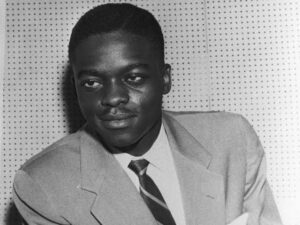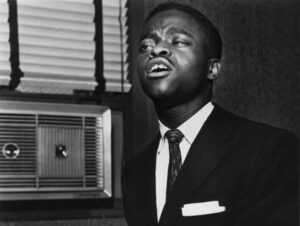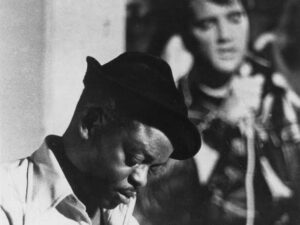When we think of Elvis Presley, images of the swiveling hips, the signature snarl, and the rich, velvety voice that defined rock ‘n’ roll come to mind. However, behind some of the King’s most memorable hits stands a figure whose name is often overshadowed by the star power of those he wrote for: Otis Blackwell. An extraordinary songwriter and performer in his own right, Blackwell crafted numerous songs that became timeless classics. It’s time to shine a spotlight on this influential but underappreciated figure in music history.
Who Was Otis Blackwell?
Otis Blackwell was born on February 16, 1931, in Brooklyn, New York. Growing up in the vibrant musical landscape of post-war America, Blackwell was deeply influenced by rhythm and blues, gospel, and the nascent rock ‘n’ roll scene. He began his career as a performer, recording his own music, but it was his songwriting talent that truly set him apart.
Blackwell’s breakthrough came in the mid-1950s when he penned “Don’t Be Cruel,” a song that would become one of Elvis Presley’s biggest hits. This success marked the beginning of a prolific period where Blackwell wrote several chart-toppers for Elvis and other artists, solidifying his legacy as a foundational figure in the evolution of rock ‘n’ roll.
The Genius Behind the Hits
Otis Blackwell’s songwriting style was characterized by its infectious melodies, compelling rhythms, and relatable lyrics. His ability to craft songs that perfectly suited Elvis Presley’s vocal style and persona was nothing short of genius. Among the many hits Blackwell wrote for Elvis, “All Shook Up,” “Return to Sender,” and “One Broken Heart for Sale” stand out as enduring examples of his craftsmanship.
“Don’t Be Cruel”:
This song, released in 1956, quickly soared to the top of the charts and became one of Elvis’s signature tunes. Its catchy melody and relatable lyrics captured the essence of youthful romance, and Elvis’s performance added the perfect touch of charisma.
“All Shook Up”: Another chart-topping hit, “All Shook Up” (1957) became synonymous with Elvis’s electrifying stage presence. The song’s upbeat tempo and playful lyrics made it an instant classic, and it remains a staple in the rock ‘n’ roll canon.
“Return to Sender”: Released in 1962, “Return to Sender” showcased Blackwell’s ability to blend humor and heartbreak. The song’s narrative, combined with Elvis’s expressive delivery, resonated deeply with listeners.
Why Otis Blackwell Deserves More Recognition
Despite his monumental contributions to rock ‘n’ roll, Otis Blackwell’s name often remains in the shadows. Several factors contribute to this relative obscurity. The music industry of the 1950s and 1960s did not always afford songwriters the recognition they deserved, often spotlighting performers instead. Moreover, Blackwell’s own reserved personality and preference for staying out of the limelight meant he did not seek the fame that others in the industry pursued.
Also, read; Chad Confirms Mahamat Idriss Déby as President with 61% of Vote
However, Blackwell’s influence on music is undeniable. His songs helped define the rock ‘n’ roll genre and set a standard for future generations of songwriters. Artists like The Beatles, The Rolling Stones, and Billy Joel have all acknowledged the impact of Blackwell’s work on their music. His ability to blend elements of R&B, rock, and pop created a sound that was both innovative and timeless.
Blackwell’s Enduring Legacy
Otis Blackwell’s contributions extend beyond his work with Elvis Presley. He wrote hits for a wide range of artists, including Jerry Lee Lewis (“Great Balls of Fire”), Dee Clark (“Hey Little Girl”), and Peggy Lee (“Fever”). Each of these songs bears the hallmark of Blackwell’s distinctive style, further cementing his place in the pantheon of great American songwriters.
Despite his passing in 2002, Blackwell’s music continues to influence and inspire. His songs are frequently covered and remain popular across generations, a testament to their enduring appeal. In recognition of his contributions, Blackwell was inducted into the Nashville Songwriters Hall of Fame and the Rock and Roll Hall of Fame, honors that underscore his importance in the history of music.
Bringing Otis Blackwell to the Forefront
To fully appreciate the history of rock ‘n’ roll, it is essential to recognize the contributions of Otis Blackwell. Efforts to bring attention to his work can include educational programs, documentaries, and tribute concerts. Music historians and enthusiasts should highlight Blackwell’s story, ensuring that his name is associated with the iconic hits he created.
Additionally, modern artists can pay homage to Blackwell by performing his songs and acknowledging his influence in interviews and performances. By celebrating Blackwell’s legacy, we can ensure that his genius is recognized and appreciated by future generations.
Conclusion
Otis Blackwell’s remarkable talent and contributions to rock ‘n’ roll deserve far more recognition than they have received. As the creative force behind some of Elvis Presley’s most iconic hits, Blackwell played a pivotal role in shaping the sound of an era.
By bringing attention to his work and legacy, we honor a true pioneer whose music continues to resonate and inspire. Otis Blackwell may have been content to stay in the background, but his place in music history is undeniably front and center.
